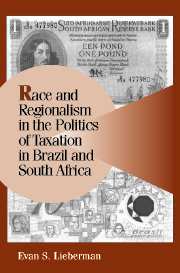Book contents
- Frontmatter
- Contents
- List of Figures and Tables
- Acknowledgments
- Abbreviations
- 1 THE POLITICS OF TAXATION
- 2 THE TAX STATE IN COMPARATIVE PERSPECTIVE
- 3 CRITICAL JUNCTURE: DEFINING NATIONAL POLITICAL COMMUNITY
- 4 THE RISE OF THE MODERN TAX STATE IN BRAZIL AND SOUTH AFRICA
- 5 SHADOWS OF THE PAST: TAX REFORM IN AN ERA OF GLOBALIZATION AND DEMOCRATIZATION
- 6 POLITICAL COMMUNITY AND TAXATION BEYOND BRAZIL AND SOUTH AFRICA
- 7 CONCLUSION
- APPENDIX: COMPARATIVE-HISTORICAL ANALYSIS
- References
- Index
- Titles in the series
4 - THE RISE OF THE MODERN TAX STATE IN BRAZIL AND SOUTH AFRICA
Published online by Cambridge University Press: 22 December 2009
- Frontmatter
- Contents
- List of Figures and Tables
- Acknowledgments
- Abbreviations
- 1 THE POLITICS OF TAXATION
- 2 THE TAX STATE IN COMPARATIVE PERSPECTIVE
- 3 CRITICAL JUNCTURE: DEFINING NATIONAL POLITICAL COMMUNITY
- 4 THE RISE OF THE MODERN TAX STATE IN BRAZIL AND SOUTH AFRICA
- 5 SHADOWS OF THE PAST: TAX REFORM IN AN ERA OF GLOBALIZATION AND DEMOCRATIZATION
- 6 POLITICAL COMMUNITY AND TAXATION BEYOND BRAZIL AND SOUTH AFRICA
- 7 CONCLUSION
- APPENDIX: COMPARATIVE-HISTORICAL ANALYSIS
- References
- Index
- Titles in the series
Summary
In the previous chapter, I showed that despite similar sets of political cleavages in Brazil and South Africa, very different definitions of National Political Community (NPC) were specified in key constitutions written around the turn of the 20th century. Chapter 2 revealed that the modern tax structures of these two countries are extremely different, particularly when seen in light of other countries around the world. This chapter develops causal links between these seemingly unrelated outcomes, while assessing the plausibility of a host of rival explanations. I attempt to make sense of divergent patterns of tax state development through a comparative historical analysis that is analytically guided by the political community model.
Even when considering only these two countries, the use of within-country comparisons, comparisons of the two countries at single moments in time, and comparisons of trajectories of development all provide significant analytic leverage. In detailing sequences of events, and the words and deeds of various actors in the respective countries, it is possible to provide a window onto causal processes and to highlight the manner in which early divergences established the basis for enduring patterns of state development.
The analysis proceeds through a series of deliberate steps. It begins by considering the respective colonial legacies of taxation, demonstrating that these inheritances cannot account for important differences in the trajectories of state development. This finding helps to establish that the critical junctures identified in the previous chapter indeed marked a break from the past for the outcome under investigation.
- Type
- Chapter
- Information
- Publisher: Cambridge University PressPrint publication year: 2003

